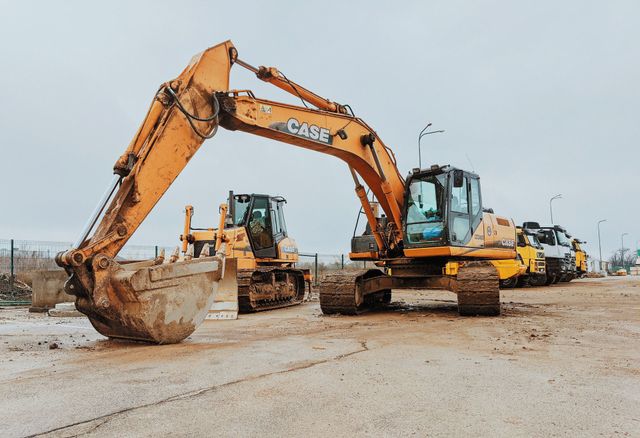Lancaster Trenching - Expert Trenching Solutions in Lancaster, Ohio
Lancaster Trenching - Expert Trenching Solutions in Lancaster, Ohio
Blog Article
Comprehensive Excavation Approaches: Understanding the Basics for Success
The mindful planning, specific execution, and thorough interest to information needed in excavation projects demand a detailed strategy that incorporates different basic elements. The true proficiency exists not just in understanding these basics however in perfectly incorporating them to navigate the complexities of excavation projects with skill.
Recognizing Excavation Job Preparation

The first phase of any kind of excavation project is the planning phase, where critical decisions are made that can substantially impact the outcome of the project. Understanding the task timeline, budget plan, and scope constraints is important for producing a detailed excavation strategy that guarantees the job's success.
One secret element of excavation project planning is the development of a detailed timeline that details the series of activities, milestones, and deadlines. This timeline serves as a roadmap for the task group, enabling them to track progress and make necessary changes to make certain the job stays on timetable. Furthermore, a well-defined spending plan that makes up all costs, including tools leasing, labor costs, and products, is necessary for preventing cost overruns and hold-ups. By very carefully taking into consideration all these aspects during the preparation stage, excavation projects can be carried out effectively and effectively, bring about successful end results.
Soil Evaluation and Site Assessment
Performing extensive soil analysis and site examination is an essential action in the prep work phase of any kind of excavation task. Soil analysis entails figuring out the make-up, framework, and buildings of the soil at the excavation site. This info is vital for recognizing the soil's bearing capacity, moisture content, and possibility for erosion, which are essential variables in establishing the excavation methods and equipment needed for the project.
Site evaluation exceeds soil analysis and encompasses a broader assessment of the overall site conditions. This evaluation consists of recognizing any kind of possible dangers, such as below ground energies, environmental issues, or unstable terrain, that could influence the excavation procedure. By extensively examining the site, job managers can develop effective excavation approaches that focus on security, effectiveness, and environmental defense.
Making use of sophisticated innovations like ground-penetrating radar, soil tasting, and drone studies can improve the accuracy and performance of soil analysis and website examination. Spending time and resources in these preliminary steps can eventually conserve time and stop expensive delays or complications throughout the excavation procedure.
Tools Choice and Utilization
Reliable excavation tasks depend heavily on critical devices selection and application to make sure optimal efficiency and productivity. Picking the best equipment for the task is important in optimizing effectiveness and decreasing downtime. Aspects such as the kind of soil, deepness of excavation, and project extent play a considerable duty in identifying one of the most appropriate tools for the task available.

In enhancement to picking the appropriate equipment, proper utilization is key to task success. Operators should be educated to deal with the tools securely and efficiently - dump read this article truck companies in ohio. Normal upkeep checks and prompt repair services assist stop malfunctions and guarantee regular performance throughout the project
Precaution and Laws Conformity
In the realm of excavation projects, focusing on precaution and compliance with policies is critical to ensuring a legally audio and safe operational environment. Precaution include a series of techniques, including conducting additional resources thorough website evaluations, implementing correct signage and obstacles, and supplying sufficient safety and security training for all workers associated with the excavation procedure. Adherence to guidelines, such as OSHA requirements in the USA, guarantees that the excavation task satisfies the essential requirements to protect employees, bystanders, and the surrounding atmosphere.

Surveillance Development and Adjusting Methods
Exactly how can project managers effectively track the advancement of excavation tasks and adjust their methods appropriately to optimize outcomes? Surveillance development is vital for guaranteeing that excavation tasks remain on track and satisfy deadlines. Task managers can utilize numerous tools and strategies to track development, such as daily progression reports, normal website evaluations, and progressed tracking technologies like drones and general practitioners tracking systems. By continuously monitoring the project's development, supervisors can recognize any type of prospective delays or problems beforehand and take positive measures to resolve them.

Conclusion
In conclusion, understanding the basics of extensive excavation techniques is important for the success of any task. By comprehending job planning, analyzing dirt and site conditions, picking proper linked here equipment, adhering to safety and security laws, and checking development, project supervisors can guarantee a smooth and reliable excavation process. Implementing these approaches will bring about effective end results and decrease prospective threats or problems throughout the excavation project.
The preliminary stage of any excavation task is the planning stage, where essential decisions are made that can dramatically impact the end result of the task. Comprehending the task budget plan, timeline, and scope constraints is essential for creating a detailed excavation strategy that ensures the job's success.
Just how can predict managers efficiently track the innovation of excavation tasks and adapt their techniques appropriately to enhance end results? By very closely monitoring progress and being prepared to adapt methods, task managers can improve the total success of excavation tasks.
By recognizing task preparation, analyzing soil and site conditions, selecting appropriate equipment, complying with safety policies, and keeping track of development, project managers can ensure a efficient and smooth excavation process.
Report this page